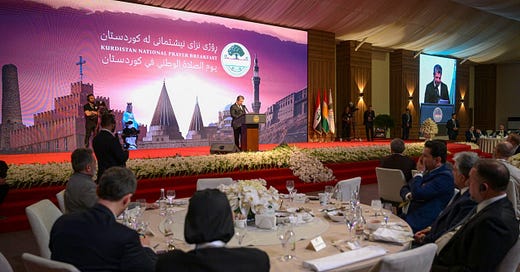Adventures in Iraq, Part II
Political Prayer, Devilish Tolerance, and the Problem of Jesus Christ
Prayer is more than just “an idea”. Prayer has immense consequences which radically change the world (depending on who you do, or don’t, pray to).
As I reflected in part 1 of my adventures in Kurdistani Iraq, the curious prayerlessness of the national breakfast was not all that much of a coincidence.
The Politics of Prayer
Many of the speeches over the three days blurred into one another, often referencing one another’s key terms: “peace”, “co-existence”, “unity”, “prayer”, “faith”. At least half a dozen speeches started by asking us all to applaud one another for what a great event this was and how great it was to have so many different people together in the room. Some speeches occasionally mentioned Jesus, one in particular saying he was the organiser of “the first ever prayer breakfast” when he made fish for his disciples after the resurrection (cf. John 21:1-13). But the event of the resurrection itself was not mentioned, nor was the cross, both of which are fundamental to what it means to actually pray in Jesus’ name.
This is when I realised, as one of my new Welsh friends pointed out to me, that all the event materials referred to “Jesus of Nazareth”, not to “Jesus Christ”. Why? Because anyone—Jew, Muslim, or Zoroastrian[!]—can get on board with a historical holy man called Jesus from a place called Nazareth without calling Him the Messiah, the Saviour, the only Son of the Most High God. I expect this is also why there were essentially no public prayers during the prayer breakfast. For in whose name are we meant to pray? Prayers can be dangerous things when prayed in Jesus’ name, as the demons know all too well:
“And crying out with a loud voice, he said, “What have you to do with me, Jesus, Son of the Most High God? I adjure you by God, do not torment me.” (Mark 5:7)
The fact that the rhetoric throughout the conference kept mentioning that “all are welcome”, that “no one is excluded”, and that “prayer unites us”, was especially curious when we were not actually praying together.
This is when something else dawned on me. The reason religious unity is such a big deal in this region is obviously because so many religious people have been persecuted. But who is persecuting them? It’s not atheists. It’s other religious people: namely, radical Muslims—exclusively so, in fact. ISIS were mentioned numerous times as the villains who oppose the tolerance and peace which the conference, and Kurdistan itself, holds dear. But here’s the snag: ISIS pray too, do they not? So if it is “prayer itself” that unites us irrespective of our “theological differences”, can we not invite ISIS to the prayer breakfast? I suspect not.
When another speech said that “prayer is action” I realised this was another way of saying: “prayer is politics”. This was not, after all, a “religious” event when it came down to it, but a political event. That’s why I kept finding myself sitting next to MPs from various countries. It turns out, this is actually fairly standard for many contemporary prayer breakfasts. The first National Prayer Breakfast began in the US in 1953, heavily supported by Billy Graham but with political action at its heart. It has come under lots of attack in recent years as a backdoor avenue to political lobbying and dealmaking.
Even Muslim leaders and scholars have heavily criticised the Kurdistan Prayer Breakfast as supporting western ideology and interfaith Abrahamic polytheism. Sheikh Hassan, head of the Higher Fatwa Council of Kurdistan (yes, they have one of those…), said this was “forbidden and heretical,” adding: “It is not permissible in Islamic lands to approach the ideology of polytheism. The result of such a conflict will lead to disgrace in this world and the afterlife.” I’m not normally one to agree with Islamic Sheikhs, but on this I can see his point. From the perspective of non-liberal Muslims, the idea that you can unite in prayer inevitably insinuates either that you are united in praying to the same God or that you are praying to multiple gods simultaneously.
A Pope Enters
There was also a fascinating (and unforgettably bizarre) moment of the conference. It happened when someone announced from the stage that we would be holding two minutes’ silence to commemorate the recent death of Pope Francis. Just after this announcement, as we awaited the beginning of this official silence, there seemed to arise some consternation on and around the stage.
Keep reading with a 7-day free trial
Subscribe to That Good Fight to keep reading this post and get 7 days of free access to the full post archives.




